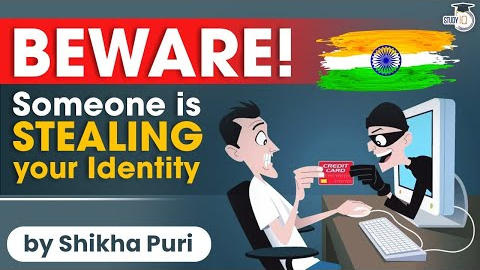Table of Contents
IS SOMEONE STEALING YOUR IDENTITY ?
What is “ID Theft”?
- “ID Theft” or ‘identity theft’ mainly refers to the crimes that take place wherein a person wrongfully obtains and uses another person’s data. These may include the theft of name, date of birth, unique identification number, bank account number, credit/debit card number, phone number, and so forth, in some way that involves any fraudulent activity or deception.
Modes of identity thefts
Hacking
- The persons known as hackers unscrupulously break into the information contained in any other computer system.
- Section 66 of I.T ACT deals with the offence of unauthorized access to the computer resource and defines it as “Whoever with the purpose or intention to cause any loss, damage or to destroy, delete or to alter any information that resides in a public or any person’s computer. Diminish its utility, values or affects it injuriously by any means, commits hacking.”
Phishing
- It uses fake email-ids or messages containing viruses affected websites. These infected websites urge people to enter their personal information such as login information, account’s information.
E-Mail/SMS Spoofing
- The spoofed e-mail is one which shows its origin to be different from where it actually originated. In SMS spoofing, the offender steals identity of another person in the form of phone number and sending SMS via internet and the receiver gets the SMS from the mobile number of the victim
Carding
- The cyber criminals makes unauthorized use of the ATM debit and credit cards to withdraw money from the bank accounts of the individual.
Vishing
- The cyber-criminal calls the victim by posing to be a bank representative or call center employee, thereby fooling them to disclose crucial information about their personal identity.
Theft of intellectual property
- Intellectual property (IP) theft is defined as theft of material that is copyrighted, the theft of trade secrets, and trademark violations etc. One of the most commonly and dangerously known consequence of IP theft is counterfeit goods and piracy
Laws governing identity thefts in India
- Indian Penal Code, 1860 (IPC)
- Forgery (Section 464),
- Making false documents (Section 465),
- Forgery for purpose of cheating (Section 468),
- Using as genuine a forged document (Section 471)
- Possession of a document known to be forged and intending to use it as genuine (Section 474)
- Section 147A deals with cheating by using any unique identification feature of any other person shall be punished with imprisonment for a term that may extend to 3 years or with fine or both.
- Section 419A deals with cheating by impersonation using a network or computer resource shall be punished with imprisonment for a term which may extend to a period of five years or a fine, or both
Information Technology Act, 2000 (IT Act)
- Section 43 If any person without permission of the owner damages to computer, computer system, etc. he/she shall be liable to pay compensation to the person so affected.
- Section 66 If any person, dishonestly or fraudulently, does any act referred to in section 43, he shall be punishable with imprisonment for a term which may extend to three years or with fine which may extend to five lakh rupees or with both.
- Section 66B Punishment for dishonestly receiving stolen computer resource or communication device is Imprisonment for a term which may extend to three years or with fine which may extend to rupees one lakh or with both.
Section 66C
Provides for punishment for Identity theft as
- Whoever, fraudulently or dishonestly make use of the electronic signature, password or any other unique identification feature of any other person, shall be punished with imprisonment of either description for a term which may extend to three years and shall also be liable to fine with may extend to rupees one lakh.






















 WhatsApp
WhatsApp